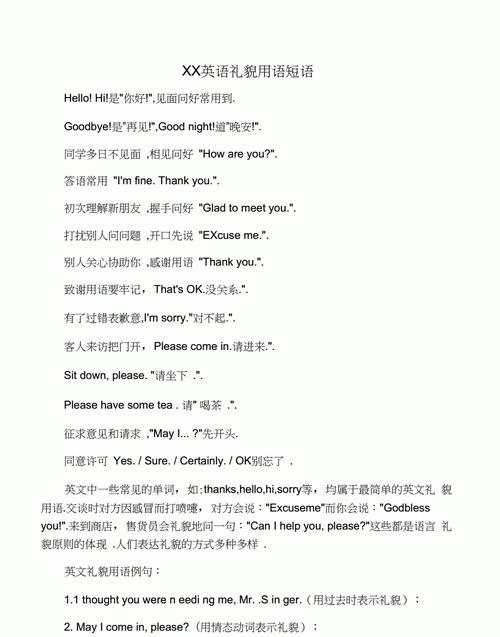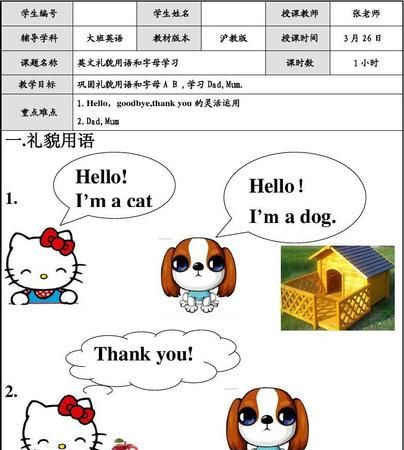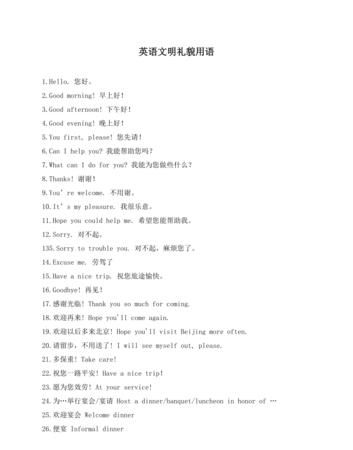本文目录
英语常用的礼貌用语有哪些
英语常用的礼貌用语1
Absolutely impossible! 绝对不可能的!
All I have to do is learn English. 我所要做的就是学英语。
Are you free tomorrow? 你明天有空吗?
Are you used to the food here? 你习惯吃这儿的饭菜吗?
Be careful. 小心、注意。
Be my guest. 请便、别客气。
Better late than never. 迟到总比不做好。
Better luck next time. 祝你下一次好运。
Better safe than sorry. 小心不出大错。
Can I have a day off? 我能请一天假吗?
Can I help? 要我帮忙吗?
Can I take a message? 要我传话吗?
Can I take a rain check? 你能改天再请我吗?
Can I take your order? 您要点菜吗?
Can you give me a wake-up call? 你能打电话叫醒我吗?
Can you give me some feedback? 你能给我一些建议吗?
Can you make it? 你能来吗?
Can I have a word with you? 我能跟你谈一谈吗?
Catch me later. 过会儿再来找我。
Cheer up! 高兴起来!振作起来!
Come in and make yourself at home. 请进,别客气。
Could I have the bill, please? 请把账单给我好吗?
Could you drop me off at the airport? 你能载我到飞机场吗?
Could you speak slower? 你能说得慢一点
Could you take a picture for me? 你能帮我拍照吗?
Did you enjoy your flight? 你的飞行旅途愉快吗?
Did you have a good day today? 你今天过得好吗?
Did you have a nice holiday? 你假期过得愉快吗?
Did you have fun? 你玩得开心吗?
Dinner is on me. 晚饭我请客。
Do you have a room available? 你们有空房间吗?
Do you have any hobbies? 你有什么爱好吗?
Do you have some change? 你有零钱吗?
Do you mind my smoking? 你介意我抽烟吗?
Do you often work out? 你经常锻炼身体吗?
Do you speak English? 你会说英语吗?
Don’t be so modest. 别这么谦虚。
Don’t bother. 不用麻烦了。
Don’t get me wrong. 别误会我。
Don’t give up. 别放弃。
Don’t jump to conclusions. 不要急于下结论。
Don’t let me down. 别让我失望。
Don’t make any mistakes. 别出差错。
Don’t mention it. 不必客气。
Don’t miss the boat. 不要坐失良机。
Don’t take any chances. 不要心存侥幸。
Don’t take it for granted. 不要想当然。
Don’t worry about it. 别担心。
Easy come, easy go. 来得容易,去得快。
Enjoy your meal. 请慢慢享用吧。
Easier said than done. 说明容易做时难。
First come, first served. 捷足先登。
For here or to go? 在这儿吃还是带走?
Forget it. 算了吧。
Forgive me. 请原谅我。
Give me a call. 给我打电话。
Give my best to your family. 代表向你们全家问好。
Have him return my call. 让他给我回电话。
Have you ever been to China? 你去过中国吗?
Have you finished yet? 你做完了吗?
Have you got anything larger? 有大一点儿的吗?
Have you got that? 你明白我的意思吗?
Have you heard from Mary? 你收到玛丽的来信吗?
He is in conference. 他正在开会。
Help yourself, please. 请自己用。
Hold your horses. 耐心点儿。
How can I get in touch with you? 我怎样能跟你联络上?
How do I look? 我看上去怎么样?
How is it going? 情况怎么样?
How late are you open? 你们营业到几点?
How long did it last? 持续了多久?
How long will it take me to get there? 到那儿要多长时间?
How much is it? 多少钱?
英语常用的礼貌用语2
一、开场白
1、开门时,一句礼貌的询问会赢得一个良好的第一印象。May I come in?(我可以进来吗?)
2、向老师们问好,面带微笑,朝气蓬勃。
Good morning / afternoon, dear professors. I am XXX. (教授们早上好/下午好,我是XXX)
3、提醒大家,适当的讨好话也是很有必要的哦!
I am very happy that I am qualified for this interview. It is a privilege to be speaking to you today.(很高兴有机会参加这次面试,今天能跟你们谈话真是我的荣幸)
4、该向老师们作自我介绍了:
Its my great honor / pleasure to introduce myself to you here.(很荣幸/高兴在这儿向大家作自我介绍)
二、对话中
1、没听清或没听懂老师的问题?别担心,礼貌地向老师询问,老师们不会难为你的。
Im sorry I didnt hear that clearly. May I ask you to repeat it, please?(对不起,我没听清楚,可否重复一遍)
I beg your pardon. I dont understand your question.(请原谅,我不太了解你的问题)
2、老师们没听明白你的回答或者误解了你的意思,一定要表明是自己的失误,并及时补充。
Excuse me,I guess I dont make myself clear.(对不起,我想是我自己没有表达清楚)
My I try to say that in another way.(或许我能试着用另一种方式说)
3、得到了老师的夸奖可不要飘飘欲仙哦,也许这是老师对你的考验呢。
Thank you for your compliment. I am far from perfect.(你过奖了,我做得还不够好)
三、结束语
1、面试就是聊天,结束时一定要表达自己聊得很开心。向老师们表达感谢当然也是不可少的礼节。
That is my pleasure. Its been nice talking with you, professors.(这是我的荣幸,和你交谈真愉快,教授)
A thousand thanks for your talking with me.(万分感谢你的面试)
2、对录取的期待也要说出来哦,不能藏着掖着,老师当然想要强烈想当他研究生的.学生。
If my application is successful, I assure that I would make every effort to be worthy of the confidence you may place in me. Thank you very much.(如果被录取,一定努力不辜负期望,谢谢)
I ll expect for your notification, professors. (我将期盼您的通知,教授)
Ill look forward to your reply.(我将静候你的回音)
在复试前,如果有可能,大家可以和几个小伙伴一起练习一下这个过程,相信大家都会有感触的。或者也可以试试不礼貌的过程,是不是觉得有礼貌的人会更容易得到好感呢?希望大家在复试中都能得到自己想要的成绩!
英语常用的礼貌用语3
咱们中国人的英语以Chinglish闻名于世,那是因为我们不习惯连读,不过这不是最重要的语言问题。老外们经常议论,很多中国人在说英语时,听起来很没有礼貌;并不是这些中国人本身没有礼貌,而是他们还没有习惯英语的礼貌表达方式。
而在商务礼仪中,为了表现对外商及外宾的重视,同时又能使商务活动达到双赢,就不可避免要使用礼貌用语。下面就让我们跟着你好语言学校的老师一起来总结一下那些商务交谈中常用的礼貌用语吧。
比如,我们通常会在咖啡厅和餐厅这么说:“我想要一杯咖啡”或是“我想要个汉堡包”。但是,如果把这些话直译成英文就会变成“I want to have a coffee”和“I want to have a hamburger”。这种表达在语法和结构上都没有问题,但老外会觉得很没有礼貌。因为通常他们会说:“could I have a coffee, please?”或者:“can Ihave a hamburger, please?”其中的“please”就是中文里“请”的意思,也是英文里最常见的礼貌用词。所以以后在和外商的会餐中,要多多使用“please”哦!让礼貌成为促成生意成功的催化剂。
这里还有一个需要注意的问题,那就是关于谢谢的回答。当人家说谢谢,你也不用说you are welcome,这样就太正式了,有点真把自己当回事,觉得帮了人家很大忙的味道。回答“cheers”或是“no worries”就好。如果仅仅是对方爱说谢谢,你甚至可以不回应他的感谢,直接说你要说的就好。
另外,如果外商邀请你参加晚宴或是聚会,而你实在有事想要拒绝,这时如果直接翻译成英文就会变成“sorry I can’t come. I have another appointment”,如果这样说,那么这个人可能永远都不会再邀请你了。如果你说“that is a good idea, I would like to join in but I really haveanother appointment today”,那么你不仅表达了想去参加的愿望还委婉地拒绝了邀请,并让人感觉语气非常有礼貌。
下面我们总结一些商务交谈中的常用礼貌句:
1、让我先谈一个问题。If you agree (with yourpermission) let me start with one issue。
2、在谈那个问题之前我想对您刚才讲的话谈点看法。Before weturn to that issue, I wish to make a few comment/ remarks on your presentation.
3、您对此事怎么看呢?I wish to benefit fromyour views on this matter./ what is your view on this matter?
4、我提议休会十分钟。I propose a ten-minutevreak.
5、对不起,我插一句。Sorry for theinterruption but.
6、我们很高兴的看到。 we note with pleasurethat
7、这个日期贵方觉得合适吗?I wonder if this datewould be suitable for you?
8、不虚此行。 It’s a rewarding trip.
9、多保重。Take care.
10、我先说这么多。So much for my remarks fornow.

礼貌用语有哪些英语
Please (请),Come in,please! (请进),Sit it down,please(请坐),Thank you! (谢谢), You are welcome (不客气)等。
礼貌用语:
1、Please (请)
2、Come in,please! (请进)
3、Sit it down,please!(请坐)
4、Thank you! (谢谢)
5、all right! (不用谢) 或 You are welcome! (不客气)
6、Excuse me。(对不起,打扰一下)
7、I am sorry。(对不起)
8、Not at all。(没关系)
打招呼用语:
1、Hello ! (你好)
2、How do you do! (你好)
3、Good morning! (早上好)
4、Good afternoon! (下午好)
5、Good night! (晚安)
6、Good bye! (再见)
7、See you later! (一会儿见)
8、See you tomorrow! (明天见)
9、How are you? (你好吗)I am fine。(我很好)
10、Whats your name? (你叫什么名字),My name is Amy (我叫艾米)。

英语常用礼貌用语有哪些
英语常用礼貌用语
常用礼貌用语、服务用语

(1)称谓用语 。
Madam 太太
Gentleman 先生
Lady 夫人、女士
(2)欢迎语 。
Welcome to our hotel。
欢迎您光临我们宾馆。
Welcome to our restaurant。
欢迎您来这里进餐。
I hope you'll enjoy your stay here。
希望您在这里生活愉快。
(3)问候语 。
How do you do!
您好
Good morning。
早上好。
Good afternoon。
下午好
Good evening。
晚上好。
Long time no see。 How are you?
多日不见,您好吗?
(4)祝贺语 。
I wish you a happy holiday!
祝您节日愉快!
Merry Christmas !
圣诞愉快!
Happy New year !
新年快乐!
(5)告别语 。
Goodbye!
再见!
Good night!
晚安!
See you tomorrow。
明天再见。
Pleasant journey!
祝您旅途愉快。
Have a good trip!
一路平安!
Hope to see you again。欢迎您再来
(6)征询语 。
What can I do for you?
我能为您做些什么吗?
Is there anything I can do for you?
需要我帮您做些什么吗?
Is there anything else?
您还有别的事情吗?
Will it trouble you?
这会打扰您吗?
Would you like…?
您喜欢…吗?
Would you want…?
您需要…吗?
Would you mind if I…?
如果您不介意的话,我可以…吗?
Please speak slowly。
请您讲慢点。
(7)应答语 。
You are welcome。不必客气。
It’s my duty。
这是我应该做的.。
I see。
我明白了。
Thank you very much!
非常感谢
Thanks for your kindness。
谢谢您的好意。
(8)道歉语 。
I’m awfully sorry。
实在对不起。
Excuse me。
请原谅。
I’m sorry to disturb you。
打扰您了。
I’m sorry,It’s our fault。
完全是我们的错,对不起。
Thanks for your reminding
感谢您的提醒。
We’ll take some measures immediately and try our best to satisfy you。
我们立即采措施尽量使您满意。
Please forget it。
请不要介意。
(9)婉言推托语 。
I’m sorry I can’t help you。
很遗憾,不能帮您的忙。
It’s very kind of you,But。。。
承您的好意,但是…。
I’ve never heard of that。
没有听说。
;日常礼貌用语有哪些
英语中一些常见的单词,如:thanks,hello,hi,sorry等,均属于最简单的礼貌用语。交谈时对方因感冒而打喷嚏,对方会说:"Excuse me",而你会说:"God bless you!"。来到商店,售货员会礼貌地问一句:"Can I help you, please?"。这些都是语言礼貌原则的体现。人们表达礼貌的方式多种多样,比如:1. I thought you were needing me, Mr.Singer.(用过去时表示礼貌); 2. May I come in, please?(用情态动词表示礼貌);3. Every piece of luggage has to be examined through.(用被动式表示礼貌);等等。本文主要谈的内容是关于英语中选择合适的语言来表达礼貌的问题。如果谈论一个坐轮椅的人(在汉语中我们说残疾人,而不是残废人),我们最好说a challenged person,而不是a disabled person。形容老年人最好用senior people, 不要用old people。也就是说,在英语使用过程中,应该尽量避免暗含性别、种族、身体、年龄等偏见或歧视的语言。如:例句一:Ms. Edward is a very large woman and moves around with difficulty but she sparkles with intelligence and wit.。 在当代,如果人们因为种族或宗教原因对别人表示不敬,就会被看作是“政治上的错误(politically incorrect)”,但是对体态丰满者的不敬和偏见却并不是这样。上句话中的but一词暗示了说话者的偏见,即:肥胖者通常是笨拙和愚蠢的。这明显是一种对他人的冒犯,所以这句话可以改为:Ms. Edward, a very large woman who moves around with difficulty, sparkles with intelligence and wit.。例句二:Her study looks at some of the special challenges faced by deaf people who are married to normal partners.。使用normal作为与残疾人相对的词来形容健全的人,实际上暗示身有残疾的人abnormal。我们虽然可以说normal/abnormal hearing, vision,body movement,etc.,但是normal和abnormal形容人则不甚合适。 这句话可以改为:Her study looks at some of the special challenges faced by deaf people who are married to hearing partners.。例句三:The islanders are a friendly and cheerful people, with a natural gift for music and dance that their Western visitors may well envy.。。每一个民族和文化都倾向于给别的文化定型(如:parsimonious Dutch,hot-blooded Italians,dour Swiss,conservative Canadians,等等),就算不考虑其中的偏见成分,这种定型没有看到构成整体的每个个体的特点。friendly and cheerful 实际上走向了种族主义的对立极端---过分的讨好。natural gift则太强调先天因素,暗含对后天努力的否定,对个体具体表现的忽视。可以改为:Visitors to the island are made to feel welcome, and are urged to take in some of the many music and dance performances that are a strong part of the local culture.。例句四:The rowdiest of the patrons were hauled off in the paddy wagon, and the rest soon dispersed.。现在我们肯定不会说“That's awfully white of you”或者“Don't try to jew me down”之类的暗含种族主义的言论,但是我们很少有人知道paddy在这里暗含对爱尔兰人的贬义。这类的例子还有:gyp(to swindle or cheat, from gypsy),Indian giver(to give only to take back),还有welsh或welch(break a promise or refuse to pay a debt)。英国人把梅毒叫作the French pox,而法国人则称之为the English pox。这句话可以改为:The rowdiest of the patrons were hauled off in the police van, and the rest soon dispersed.。还有一类礼貌涉及性别问题,这也是本文将要特别谈到的问题。英语语言趋向于把男性作为标准:绝大部分词根是男性(阳性),而女性(阴性)则需要加词缀具体说明。对于力图避免这类歧视的人来说,英语中最具挑战性的部分是人称代词。从传统语法角度来讲,使用he或him来指代未明性别者是可以的,但是现在越来越多的人把这看作是性别歧视。可是英语中本来是没有一个代词专指代男性和女性集合中的任何一个的(有人发明了“shim”,不过似乎没有得到大众的认可),所以为了避免性别歧视,人们只好写作he/she,s/he或把they用作一个单数代词。he/she或s/he写起来或听起来很不顺,而they作单数又不符合语法,人们这么写或这么说只是为了显示自己不会使用阳性代词来指代所有的人(包括女性)。当然在口语中,象"Someone left this fan letter for you, but they didn't sign it"这样的句子听起来是很自然的,也不会产生歧义,但是在书面语中语法规则要严格得多,所以they一般只指第三人称复数。如下面一句话就很不合适,并容易产生歧义:Response to the new version of the program has been favorable; one customer, for example, said that they doubled their productivity within the first threeweeks.。另外,不定代词each,every,anybody等本身是单数,所以按语法规定不能于they结合,所以下面两句话都是语法错误的:Each student must hand in their own lab report.Every guest was given a name tag when they arrived.同时,我们也可以用he or she(him or her;his or hers),不过要注意一点:尽量避免在一句话中重复使用he or she,否则就会显得很邋遢。当谈话涉及到的对象不止是一个人时,用复数人称代词指代就显得更加简洁准确。比如:We asked each participant to speak openly about his feelings.We asked all participants to speak openly about their feelings.(更好)某些情况下,我们还可以用one来代替he(one有时也可以用来代替第一、二人称)。使用one时,通常说话者和听话者属于相同的集团,或者有着相同的特点,共同的利益。因此,从某种意义上说,one传达了“you or I”的意思。比如:As a writer, one could workit into a book addressing other writers.( Is one making oneself clear?)。再比如在一篇以phisicians为对象的文章中,与其说:Clinical judgment involves the phisician making use of his experience, as well as his knowledge of the particular patient.,不如说:Clinical judgment involves making use of one's experience, as wellas one's knowledge of the particular patient。不过要注意一点:one也不可以过度使用,否则显得“stuffy”。在某些可以和读者进行直接交流的文体中,比如在手册、说明书中,我们可以使用you来代替第三人称。如:The reader should familiarize himself with these terms before proceeding.Familiarize yourself with these terms before proceeding.(更好)为了完全避免性别歧视,我们可以使用被动语态。比如与其说:The advantage to making surgeon responsible for acquiring the research data is that he often acquires it in any case for clinical purposes.,不如说:The advantage to making surgeon responsible for acquiring the research data is that this information is oftenrequired in any case for clinical purposes.。但是有时使用被动语态会使句子显得笨拙,或产生歧义,所以被动语态要慎重使用。最后,我们还可以在主动句中避免使用代词,一般情况下,这也是最简便的方式。比如:A psychiatrist may ethically obtain research data from his patients, but his main objective must remain that of attending to their needs.A psychiatrist may ethically obtain research data from patients, but must not lose sight of the main objective of attending to their needs.(更好)The bashful writer is reluctant to come right out and state his position firmly.The bashful writer is reluctant to come right out and state a firm position.(更好)有时不用代词很难准确的表情达意,这时应该优先考虑表意的准确性。英语礼貌用语表达涉及到人们日常生活的方方面面,是一个庞大复杂的系统,本文只就其中的一两点问题进行了比较肤浅的探讨。为了更加深入的了解英语礼貌用语表达,我们必须深入的了解整个的英语文化,它的历史,并在具体的语言实践中去认识和掌握它。

以上就是关于常用的英语礼貌用语有哪些 ,英语常用的礼貌用语有哪些的全部内容,以及常用的英语礼貌用语有哪些 的相关内容,希望能够帮到您。

